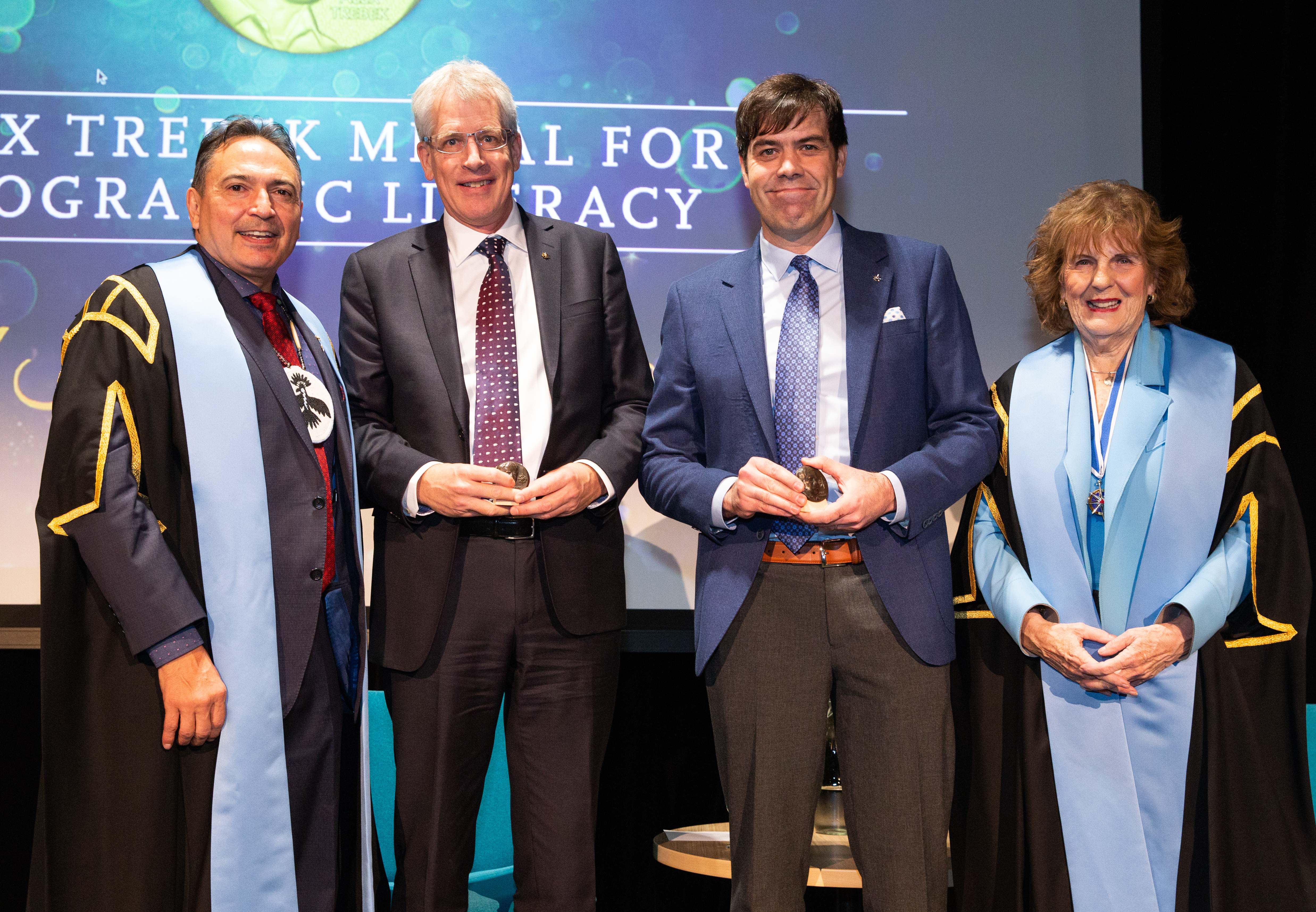Faculty members Zac Robinson and David Hik receive the Alex Trebek Medal for Geographic Literacy
04 January 2023

Hik (centre left) and Robinson (centre right) receive the Trebel Medal. Photo credit Ben Powless
Mountains are beloved across the globe for many reasons. They are a majestic, mysterious and sometimes intimidating feature, no matter the location or climate in which they’re found. It’s no surprise, then, that a course about mountains co-developed by Faculty of Kinesiology, Sport, and Recreation (KSR) associate professor Zac Robinson and Faculty of Science adjunct professor David Hik, has become Class Central’s fourth-highest-ranked Massive Online Open Course (MOOC) of all time and is presently the No. 1 ranked environmental science MOOC.
Robinson and Hik were recently awarded the Alex Trebek Medal for Geographic Literacy for creating the Mountains 101 MOOC. This award, presented by the Royal Canadian Geographical Society, recognizes educators who have made significant contributions to geographic literacy in Canada. Not bad for a historian and an ecologist who started out simply wanting to make it possible for interested undergraduate students to learn more about mountains.
When Robinson and Hik first crossed paths over 15 years ago, they were only two of several University of Alberta faculty who were working on mountain-related projects, or simply enamoured by mountains. They all bumped into each other and their grad students at the university often enough that eventually an informal research group grew on campus. Over time, Robinson and Hik joined forces with Martin Sharp, a glaciologist from the Department of Earth and Atmospheric Sciences, to create an undergraduate course — The Mountain World. Because the course is interdisciplinary — covering natural, historical, literary and human aspects of mountains — it is offered through both the Faculty of KSR and the Faculty of Science.
The Mountain World became very popular, attracting students from up to nine different faculties at any given time. “It’s a wonderful class to teach. It’s a survey of a whole landscape, and how things are connected,” says Robinson. “What brought everybody together was their excitement for these places. We had a lot of fun.”
While it was a popular course, the traditional university enrolment system meant only 80 to 90 students were able to fit it into their schedule each term. Luckily, as The Mountain World gained popularity, so did the concept of MOOCs. In 2015, spurred by the success of Dino 101, the university approached Robinson and Hik about the possibility of developing a MOOC, and when the institution made funding available, the team were on their way.
It would take almost two years to develop Mountains 101. The duo used green screen technology as well as mountain photography and film footage donated to the project from partnering agencies Parks Canada, Travel Alberta, the Alpine Club of Canada and the Association of Canadian Mountain Guides. This made it possible for anyone, anywhere to have an immersive mountain experience online. “The year we spent in development helped shape, not just the content, but our delivery so that the lessons would be engaging,” says Hik.
While building the course, Robinson and Hik also brought together an enthusiastic community of mountain experts and beyond, including nearly 50 special cameos from scientists, land-use managers, Indigenous leaders and politicians. Even Prime Minister Justin Trudeau makes a special appearance .
Since its 2017 launch, Mountains 101 has had more than 70,700 registrants from more than 170 countries and reviews are overwhelmingly positive. The launch saw significant enrolment, but a spike when the COVID-19 pandemic began in 2020 surpassed that, with people taking advantage of extended time at home and unable to get away for an in-person mountain retreat. As one student puts it, the course “brings mountains to the people.”
For Robinson and Hik, the reception of the course is both humbling and encouraging. They hope people who take Mountains 101 will develop a better understanding of the crucial role of mountains. “Mountains are far more than mere destinations to visit and enjoy. They are of critical importance to people, everywhere,” says Robinson. “They are our water towers, the headwaters of our major rivers, and a critical source of fresh water globally. They are hotspots for biodiversity, and cultural diversity as well. They provide us with energy, natural resources, staple foods, spiritual wealth, and more. Mountains are home to nearly a billion people. And they’re now critically recognized as sentinels for change in our warming planet.”
The United Nations designated 2022 as the International Year of Sustainable Mountain Development.
“The impact of climate change on mountains due to human influences has observable and serious consequences for mountain peoples and ecosystems around the world, but Mountains 101, to a small extent, we hope, is contributing to the world’s understanding of these special places,” says Hik.
Online cohorts for Mountains 101 begin monthly.